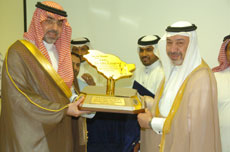JEDDAH, 4 May 2006 — Saudi Arabian General Investment Authority (SAGIA) Governor Amr Al-Dabbagh said here yesterday that the Kingdom’s investment climate was shaping to be the best ever.
“Thanks to the Kingdom’s buoyant economy and visionary policies, investments from both domestic and overseas sources are increasing,” Al-Dabbagh said at the opening of Modern Products Company’s (MPC) SR70 million investment in state-of-the-art technology to expand its manufacturing plant in the Jeddah Industrial City. The plant’s expansion is aimed to increase production lines and capacity.
The enhancement of the investment environment in the Kingdom shows that SAGIA is realizing its goals and objectives, Al-Dabbagh said.
“SAGIA has been effectively encouraging investment in the Kingdom and providing the right environment for economic growth and stability,” Al-Dabbagh said while speaking to reporters after the formal ribbon cutting ceremony. “The plant has made tremendous progress in the past few years, and has emerged as one of the largest baby care manufacturing facilities in the Middle East,” Al-Dabbagh added.
MPC Chairman Osama Ismail Abu Dawood said Al-Dabbagh’s visit was a landmark event for the company, which manufactures diapers and feminine sanitary napkins. “His visit highlights the recent industrial and investment achievements and, at the same time, underscores opportunities for further growth and advancement,” Abu Dawood added.
MPC opened its 87,000 square meter manufacturing facility, following its establishment in association with Procter & Gamble, in 1982, Ahmed Ibrahim Linjawy, external relations director at MPC, said in a presentation. The plant has production lines for its “Pampers” baby diapers, and “Always” feminine sanitary napkins. It manufactures a range of consumer products at the plant of its sister company, Modern Industries Company (MIC), in Dammam.
The company has invested SR250 million over the past three years in advanced technology to meet increasing local and regional market demand and needs. The company, which has more than 65 Saudi nationals among its employees, has allocated SR20 million for training and employment programs. “The programs are directed toward the employment of Saudis at both technical and managerial levels,” Linjawi said, adding that the new production lines have been installed and supervised by Saudi nationals. The MPC is considered to be one of the largest exporters of Saudi products that are shipped to more than 30 countries across the GCC, the Middle East, the rest of Asia and Africa. “Our investments reflect our commitment to increase efficiency and capacity,” Linjawi added.
MPC and MIC, both joint ventures of Procter & Gamble, which have emerged as major investors in the economy, have been contributing toward community and social welfare activities. Bunyan — inspiring children to build a better future — is the corporate social responsibility of the two companies.
MPC is also considered to be a leader in the development of Saudi capabilities in top management positions, which is indicative of its commitment toward harnessing Saudi talent and training to provide the right skills required for excelling in their careers and contributing positively to the company’s development and progress.










